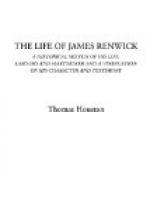allegiance of subjects, bind both equally to the support
of Prelacy—which is declared to be established
unchangeably in England and Ireland. The whole
civil system is based on expediency and the popular
will, and not on Scriptural principles. The authority
claimed and exercised by the monarch over the Presbyterian
Establishment in Scotland, and the National Church
in England and Ireland, is grossly Erastian.
The introduction of Popery into the bosom of the State—the
admission of Papists to offices of power and trust
in the nation, and the endowment of Popish Seminaries
and chaplains—which the Revolution Settlement
barred—but which the Antichristian and infidel
policy of recent times has enacted, show still more
clearly that the civil and political system established
in these countries is diametrically opposed to that
which was set up at the era of the Reformation, and
was contended for by the Scottish martyrs—and
impose on all who would honestly promote the ends
of the National Covenants, the obligation to maintain
distinct separation from it.



